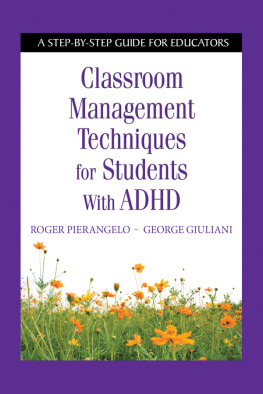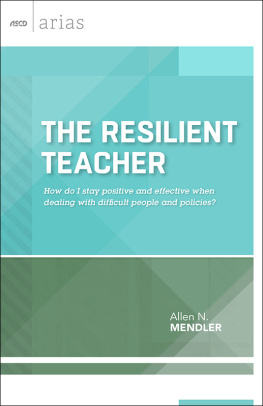Mendler - Motivating students who don’t care : successful techniques for educators
Here you can read online Mendler - Motivating students who don’t care : successful techniques for educators full text of the book (entire story) in english for free. Download pdf and epub, get meaning, cover and reviews about this ebook. City: Bloomington, year: 2000, publisher: Solution Tree, genre: Home and family. Description of the work, (preface) as well as reviews are available. Best literature library LitArk.com created for fans of good reading and offers a wide selection of genres:
Romance novel
Science fiction
Adventure
Detective
Science
History
Home and family
Prose
Art
Politics
Computer
Non-fiction
Religion
Business
Children
Humor
Choose a favorite category and find really read worthwhile books. Enjoy immersion in the world of imagination, feel the emotions of the characters or learn something new for yourself, make an fascinating discovery.

- Book:Motivating students who don’t care : successful techniques for educators
- Author:
- Publisher:Solution Tree
- Genre:
- Year:2000
- City:Bloomington
- Rating:4 / 5
- Favourites:Add to favourites
- Your mark:
- 80
- 1
- 2
- 3
- 4
- 5
Motivating students who don’t care : successful techniques for educators: summary, description and annotation
We offer to read an annotation, description, summary or preface (depends on what the author of the book "Motivating students who don’t care : successful techniques for educators" wrote himself). If you haven't found the necessary information about the book — write in the comments, we will try to find it.
Mendler: author's other books
Who wrote Motivating students who don’t care : successful techniques for educators? Find out the surname, the name of the author of the book and a list of all author's works by series.
Motivating students who don’t care : successful techniques for educators — read online for free the complete book (whole text) full work
Below is the text of the book, divided by pages. System saving the place of the last page read, allows you to conveniently read the book "Motivating students who don’t care : successful techniques for educators" online for free, without having to search again every time where you left off. Put a bookmark, and you can go to the page where you finished reading at any time.
Font size:
Interval:
Bookmark:
Who Dont Care
Successful Techniques for Educators
Allen N. Mendler

Copyright 2000 by Solution Tree Press
All rights reserved, including the right of reproduction of this book in whole or in part in any form.
555 North Morton Street
Bloomington, IN 47404
800.733.6786 (toll free) / 812.336.7700
FAX: 812.336.7790
email:
solution-tree.com
Printed in the United States of America
ISBN 978-1-935249-67-2
TO MY WONDERFUL DAUGHTER LISA, whose goodness, caring, and enthusiasm for life inspires me to keep working at making our schools places of success for all students.
To Brian, my bright and sensitive son, whose remarkable resilience is testament that struggles in and out of school can build character and success with the support of caring adults.
To Ticia, my daughter-in-law, who is testament to how effort and balance make for success.
To my son Jason, whose inner tenacity, self-motivation, and love of learning reminds me of the influence that educators who enthusiastically convey their knowledge can have on their students.
I WISH TO THANK THE MANY EDUCATORS around the country who appreciate my work and share their work with me. They inspire me to create, implement, and then offer practical ideas that make a difference for students.
Special thanks is given to Rick Curwin, my partner, best friend, and frequent co-author, for contributing some of this material which is contained in our book, Discipline with Dignity for Challenging Youth (Mendler & Curwin, 1999).
In addition, I want to thank the following people whose ongoing support is most appreciated:
Tammy Rowland, my program and office manager at Discipline Associates
Phil Harris at the Association for Educational Communications and Technology
Jeff Jones at Solution Tree (formerly National Educational Service)
Frank Koontz at the Bureau of Education and Research
Nancy Modrak at the Association for Supervision and Curriculum Development
MaryAnn Beiter at the Learning Institute
Larry Brendtro at Reclaiming Youth International
Leah Jerabek at the Milwaukee Public Schools
Laura McCullough at the Kentucky Department of Education
Dave and Colleen Zawadzki at Syracuse City Schools
Elizabeth Oster at the Rochester City Schools
Finally, as always, a special thank-you to my wife, Barbara, for her love and intimacy.
I dont have to if I dont want to!
This class is boring.
When am I ever going to use that!
How come you gave me an F?
Ill come, but you cant make me do anything.
MORE TEACHERS THAN EVER are frustrated with legions of students who expect success but are unwilling to work for it. Fast and easy has replaced work and earn as a motto that guides too many of our youth. Students are missing the idea that it is their responsibility to learn information, practice material, and attend school. They often feel as though they should be adequately entertained. Feeling good has become more valued than working hard. Students of today are much like the character in the comic strip The Wizard of Id. The character applies for a job and is asked, Do you have any education? He answers, No, but I have high self-esteem. Expectations of entitlement with minimal effort are not uncommon in todays classrooms.
There is a direct relationship between motivation and discipline. The hard to motivate are often hard to discipline. Our seminars are increasingly attended by educators who question what to do with students who are not prepared, do not care, and will not work, although it is difficult to assess which is the cause and which is the result. Finding tools and strategies to increase motivation can solve many behavior problems. Although these problems defy simplistic solutions, there are many things that educators can do to reawaken motivation in students who have lost interest and perhaps hope. Those who are hard to motivate and control often make us wonder why we should bother with them at all when there are so many others who care and want to learn. They make us question the worth of reaching out to them when they often sap our own energy and motivation. In addition, they often push our buttons, make us feel defeated, interfere with other students, challenge our authority, and evoke strong emotions that interfere with reason. Unless we are careful, they can burn us out.

AN EXPECTATION OF ENTITLEMENT is easy to acquire in a culture that too often values what we have rather than who we are. During an age in which abundance of things seems to take precedence over giving the gift of our time, guilt often leads parents to give materially to their children without attaching expectations. When children are spoiled into believing that what they want is what they should have, school provides a rude awakening when it links success to personal effort. Changing the culture is difficult at best, so wise educators need to understand and use social dynamics to create, inspire, and cultivate motivation within their students.
From a psychological perspective, many students who have bad behavior or who give up are covering their concerns about being perceived as stupid. They are protecting themselves from the embarrassment of looking dumb in the eyes of their classmates, parents, and selves. Some students find power and control in their refusals to work. They are often competent and capable, but their need to be in control is so strong that they employ a self-defeating strategy to exert their independence. Depression among children as young as preschoolers is often overlooked as a cause of poor school motivation. When depression is adequately diagnosed, treatment through counseling and drug therapy can often be effective. Whether for competence or autonomy, lack of motivation is a protective mechanism that must be respectfully challenged in order to help students make better choices.
Our professional responsibility requires that we teach all students and make our best effort to excite even those who seem not to care. If we give up on them, they will cause more problems and be more hurtful, dangerous, and costly. Just as a good subject area curriculum provides the big picture along with specific units of instruction, this book offers a curriculum guide along with many specific methods that can help us motivate students who dont care.

ALL OF THE STRATEGIES THAT ARE OFFERED in this book have proven themselves to be very effective tools in motivating students. Although the goal of this book is to offer educators specific, practical, and proven strategies, it is not a cookbook with the recipe for producing perfectly motivated students. Instead, it offers a set of beliefs followed by five specific processes that form the framework for the many classroom-friendly strategies designed to inspire motivation in students who are giving up. It is most important to be guided by the framework rather than to feel compelled to use all of the strategies.
Font size:
Interval:
Bookmark:
Similar books «Motivating students who don’t care : successful techniques for educators»
Look at similar books to Motivating students who don’t care : successful techniques for educators. We have selected literature similar in name and meaning in the hope of providing readers with more options to find new, interesting, not yet read works.
Discussion, reviews of the book Motivating students who don’t care : successful techniques for educators and just readers' own opinions. Leave your comments, write what you think about the work, its meaning or the main characters. Specify what exactly you liked and what you didn't like, and why you think so.










